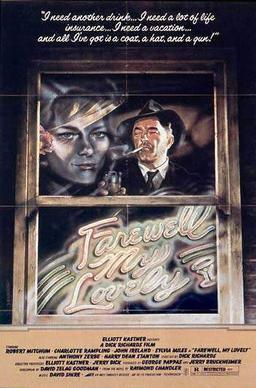A Fine Technicolor Film Noir
 - Author Raymond Chandler's Private Detective Philip Marlowe character sets out on his second case of the 1970s in Farewell My Lovely (1975), a fantastic adaptation to Chandler's novel of the same name. The highly entertaining mystery seen in this film begins with Marlowe being hired out to find Velma, the former girlfriend of the big and mean Moose Malloy. As if Marlowe has some kind of chronic condition for getting into trouble, he ends up getting caught up in a twisted web of danger as he sets out to find Moose's dame.
- Author Raymond Chandler's Private Detective Philip Marlowe character sets out on his second case of the 1970s in Farewell My Lovely (1975), a fantastic adaptation to Chandler's novel of the same name. The highly entertaining mystery seen in this film begins with Marlowe being hired out to find Velma, the former girlfriend of the big and mean Moose Malloy. As if Marlowe has some kind of chronic condition for getting into trouble, he ends up getting caught up in a twisted web of danger as he sets out to find Moose's dame.Farewell My Lovely is very similar to other Philip Marlowe films but does hold its own as an original addition to the unofficial series. Staying true to the unspoken underground sin of the 1940s, as written in Chandler's novel "Farewell My Lovely," this film is a little closer to the source material than the first film based on the novel (Murder My Sweet in 1944). Also, unlike the previous Philip Marlowe film, The Long Goodbye (1973), Farewell My Lovely does not redefine Marlowe in a 1970s setting but is a period film set in the 1940s. Director Dick Richards basically creates a dark and stylish 1940s film noir with 1970s equipment and a throw back 1940s film noir star: Robert Mitchum.
Mitchum is a great Philip Marlow and easily ranks along side other screen Marlowe greats Dick Powell from Murder My Sweet, Elliot Gould from The Long Goodbye, and Humphrey Bogart from 1946's The Big Sleep as a wonderful screen incarnation of the classic character. Mitchum does not go out of his way to give much of a "performance" that differs from his own personality, but he does not have to because the Philip Marlowe character is very similar to Mitchum's classic screen presence. It is no stretch for Mitchum but it is a great performance - for all intents and purposes his swan song, a performance that captures the essence of what made Mitchum famous and legendary: Mitchum's Marlowe is sarcastic yet professional, lethargic and passionate at the same time; he balances brutality and morality, carries a mean yet comforting swagger, and is tougher than a gorilla on steroids but has an easy-to-rupture vulnerable side.
Supporters John Ireland, Anthony Zerbe, and Harry Dean Stanton also make a decent showing with Charlotte Rampling and Sylvia Miles (in an Oscar nominated performance) really standing out among the supporting cast. Jack O'Halloran is also a great casting choice for gigantic tough-guy Moose Malloy and you cannot miss Sylvester Stallone in a non-speaking role.
The only downside to Farewell My Lovely is linked with one of its greatest strengths. Because Farewell My Lovely stays very faithful to the original Chandler novel, it also ends up looking very similar to the 1944 film that is also closely based off of the novel: Murder My Sweet. We see scenes and sets of dialogue in Farewell My Lovely that look as if they were lifted right out of Murder My Sweet, taking away some originally points. Despite this factor, Farewell My Lovely remains a, may I say, lovely film noir adaptation of Raymond Chandler - plus, if one has not seen Murder My Sweet then there will be no trouble in the first place.
CBC Rating: 9/10
No comments:
Post a Comment